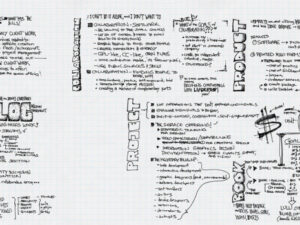(last edited on May 22, 2018 at 12:38 pm)
Our New Media User Group turned 1 year old in February, and in that year it’s grown far beyond my initial expectations. We’re still tiny, of course, but I’ve learned a lot about how to start a group up. It’s a lot easier than I thought, so if any of you out there are going through the I wish there was a group of people I could hang out with, take heart! It is doable!
The first step was to realize what it is I wanted from a group: an experience that felt like the kind of gathering I would like. While the group’s actual membership has grown more diverse, I find that our core values have remained largely unchanged. I just wrote the following on our group Basecamp welcome page:
So how do you know you belong in the New Media Group? You want to share stories about your work and life experiences with a group of interested and diverse people. Although we started with art and interactive media as a base, our discussions include technology and other professional practice. If you enjoy learning, you’ll fit right in no matter what your background. You are seeking other creative people who are passionate about something, in a supportive environment. We do our best to avoid the “uh, I don’t know anyone here, and everyone already knows each other” effect. You are not interested in traditional “business networking”. When we’re at the table, the talk is about what we do. Bring us your story, not your resume! Of course, after you get to know people, business tends to happen naturally :)
This has been, I think, the base of what makes the group comfortable for me. And since I say it up front, the people who show up tend to also be comfortable with it. It creates a sort of inner harmony.
If you’re interested in trying this yourself, come up with your own list of “important things”. You get to design the group! As the organizer, though, you need to consider these other factors:
- You have to be truly interested in communicating what’s going on to your group membership. I don’t think of myself as an organizer. Instead, I consider my role to be host of an ongoing party. I want to make sure that people are introduced to each other properly, know about what’s going on, and feel right at home. As the group has matured, other people have naturally taken over some hosting duties too, and the result is a good group energy. So if you like throwing parties and inviting friends over, this is an approach that could work for you. And remember…you can dictate the kind of party you are throwing. That’s basically all I’m doing. Organizationally, there’s all the pre-party stuff that you do, and also the post-party storytelling. You want people to come to your next party? Let them know what they missed! I have had to put quite a bit of time into communication (the project management side of me finally pays off). The main tools I use are mailing list software (with email addresses scrubbed), our group wiki, and a laptop to keep notes during meetings. I also post fairly regularly and try to have a call to gather every 2-3 weeks. I post the after-meeting notes as often as I can, so people know what we talked about, and archive them on the Wiki. I’m giving Basecamp a try too, so we can have a more private discussion area than the mailing list (I am sensitive to spammers harvesting our addresses).
Meeting strangers. That was a lot less frightening than I thought because of a lucky accident—I had to meet people one-on-one first because of scheduling. In the 1-on-1 scenario, I just talked about what I was interested in and asked what they were interested in. I asked them about their backgrounds, what their dreams were, how they got to be a designer/artist/etc. And that was enough. By the time we actually met in a group, I could effectively play the host role because I knew who they were. It also helps to know that if someone has responded to your call for action, they are already interested in meeting you. So don’t feel awkward. Just ask questions and share some stories about yourself. That’s all people are looking for.
Getting people to come. This is the one that a lot of user groups thrash around with, and they often feel that they need a “headliner” to get people out of their houses. Our group is a little different because the draw is “hosted conversation”, and for whatever reason people understood that. It’s not really targeted at the general population, but then again what is important to me is making good quality contacts, not size. And I’d say that in that regard it’s been successful. Promotion I haven’t worried about yet; we’ve grown organically through personal introductions. I’m considering bookstore cafe bulletin boards, Craig’s List, Upcoming.org, and direct contact with companies to see what interest there is. For now, I have my hands full enough.
<
p>I haven’t actually ended up meeting many more new media designers, which was my original motivation. Instead, I’ve made a lot of friends and met people who I otherwise might not have, and this has energized and enriched my own sense of purpose. And it just started with a couple of people I had never met before.
Anyone else have some user group tips or stories to share? Please post a comment! :-)



0 Comments